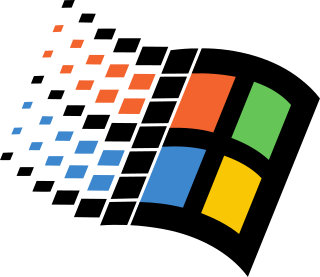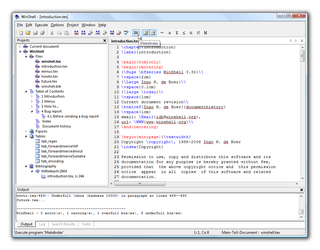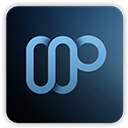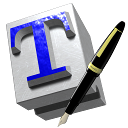Microsoft Windows was announced by Bill Gates on November 10, 1983. Microsoft introduced Windows as a graphical user interface for MS-DOS, which had been introduced two years earlier. The product line evolved in the 1990s from an operating environment into a fully complete, modern operating system over two lines of development, each with their own separate codebase.

LaTeX is a software system for document preparation. When writing, the writer uses plain text as opposed to the formatted text found in WYSIWYG word processors like Microsoft Word, LibreOffice Writer and Apple Pages. The writer uses markup tagging conventions to define the general structure of a document to stylise text throughout a document, and to add citations and cross-references. A TeX distribution such as TeX Live or MiKTeX is used to produce an output file suitable for printing or digital distribution.
Windows is a group of several proprietary graphical operating system families developed and marketed by Microsoft. Each family caters to a certain sector of the computing industry. For example, Windows NT for consumers, Windows Server for servers, and Windows IoT for embedded systems. Defunct Windows families include Windows 9x, Windows Mobile, and Windows Phone.

Windows XP is a major release of Microsoft's Windows NT operating system. It was released to manufacturing on August 24, 2001, and later to retail on October 25, 2001. It is a direct upgrade to its predecessors, Windows 2000 for high-end and business users and Windows Me for home users, available for any devices running Windows NT 4.0, Windows 98, Windows 2000 and Windows Me that meet the new Windows XP system requirements.
In computing, Physical Address Extension (PAE), sometimes referred to as Page Address Extension, is a memory management feature for the x86 architecture. PAE was first introduced by Intel in the Pentium Pro, and later by AMD in the Athlon processor. It defines a page table hierarchy of three levels (instead of two), with table entries of 64 bits each instead of 32, allowing these CPUs to directly access a physical address space larger than 4 gigabytes (232 bytes).

Windows 9x is a generic term referring to a series of Microsoft Windows computer operating systems produced from 1995 to 2000, which were based on the Windows 95 kernel and its underlying foundation of MS-DOS, both of which were updated in subsequent versions. The first version in the 9x series was Windows 95, which was succeeded by Windows 98 and then Windows Me, which was the third and last version of Windows on the 9x line, until the series was superseded by Windows XP.

WinShell is a freeware, closed-source multilingual integrated development environment (IDE) for LaTeX and TeX for Windows.
MiKTeX is a free and open-source distribution of the TeX/LaTeX typesetting system for Microsoft Windows. It also contains a set of related programs. MiKTeX provides the tools necessary to prepare documents using the TeX/LaTeX markup language, as well as a simple TeX editor: TeXworks. The name comes from Christian Schenk's login: MiK for Micro-Kid.

XeTeX is a TeX typesetting engine using Unicode and supporting modern font technologies such as OpenType, Graphite and Apple Advanced Typography (AAT). It was originally written by Jonathan Kew and is distributed under the X11 free software license.

MediaPortal is an open-source media player and digital video recorder software project, often considered an alternative to Windows Media Center. It provides a 10-foot user interface for performing typical PVR/TiVo functionality, including playing, pausing, and recording live TV; playing DVDs, videos, and music; viewing pictures; and other functions. Plugins allow it to perform additional tasks, such as watching online video, listening to music from online services such as Last.fm, and launching other applications such as games. It interfaces with the hardware commonly found in HTPCs, such as TV tuners, infrared receivers, and LCD displays.

WinEdt is a shareware Unicode (UTF-8) editor and shell for Microsoft Windows. It is primarily used for the creation of TeX documents, but can also be used to edit HTML or any other type of text file. It can be configured to run as a front-end for a variety of TeX systems, including MiKTeX, fpTeX and TeX Live. WinEdt's highlighting schemes can be customized for different modes and its spell checking functionality supports multi-lingual setups, with dictionaries (word-lists) for many languages available for downloading from WinEdt's Community Site. It supports DVI and PDF workflow.
In computer security, executable-space protection marks memory regions as non-executable, such that an attempt to execute machine code in these regions will cause an exception. It makes use of hardware features such as the NX bit, or in some cases software emulation of those features. However, technologies that emulate or supply an NX bit will usually impose a measurable overhead while using a hardware-supplied NX bit imposes no measurable overhead.
The Logical Disk Manager (LDM) is an implementation of a logical volume manager for Microsoft Windows NT, developed by Microsoft and Veritas Software. It was introduced with the Windows 2000 operating system, and is supported in Windows XP, Windows Server 2003, Windows Vista, Windows 7, Windows 8, Windows 10 and Windows 11. The MMC-based Disk Management snap-in hosts the Logical Disk Manager. On Windows 8 and Windows Server 2012, Microsoft deprecated LDM in favor of Storage Spaces.

Software remastering is software development that recreates system software and applications while incorporating customizations, with the intent that it is copied and run elsewhere for "off-label" usage. The term comes from remastering in media production, where it is similarly distinguished from mere copying.

TeX Live is a cross-platform, free software distribution for the TeX typesetting system that includes major TeX-related programs, macro packages, and fonts. It is the replacement of its no-longer supported counterpart teTeX. It is now the default TeX distribution for several Linux distributions such as openSUSE, Fedora, Debian, Ubuntu, Termux and Gentoo. Other Unix operating systems like OpenBSD, FreeBSD and NetBSD have also converted from teTeX to TeX Live.
muLinux is an Italian, English-language lightweight Linux distribution maintained by mathematics and physics professor Michele Andreoli, meant to allow very old and obsolete computers to be used as basic intranet/Internet servers or text-based workstations with a UNIX-like operating system. It was also designed for quickly turning any 80386 or later computer into a temporary, powerful Linux machine, along with system repair, education, forensic analysis and what the developer called proselytizing. In 2004 reviewer Paul Zimmer wrote, "Although there are several other single-floppy Linux distributions, none can match muLinux's extensive and unique combination of useful features." The last version update was in 2004, when further development of this "linux-on-a-floppy" distribution ended.
Windows NT is a proprietary graphical operating system produced by Microsoft, the first version of which was released on July 27, 1993. It is a processor-independent, multiprocessing and multi-user operating system.

TeXworks is free and open-source application software, available for Windows, Linux and macOS. It is a Qt-based graphical user interface to the TeX typesetting system and its LaTeX, ConTeXt, and XeTeX extensions. TeXworks is targeted at direct generation of PDF output. It has a built-in PDF viewer using the poppler library; the viewer has auto-refresh capability, and also features SyncTeX support.
Verbosus is a browser-based LaTeX editor which allows a user to create and handle LaTeX projects in a browser. The graphical user interface (GUI) does deliberately not resemble non-browser-based Editors such as LEd or TeXworks. It was designed to function and being used in a browser.

TexLab is a TeX editor based on parallel programming. Contrary to other TeX editors which use a text file as input, TexLab was designed to process small binary document modules. TexLab typesetting engine is implemented by a thread pool to execute MiKTeX commands, such as: LaTeX, XeTeX or pdfTeX. MiKTeX is the version of LaTeX for Microsoft Windows; it consists of a set of tools to process text. Christian Schenk is the creator of MiKTeX, he studied Computer Science at TU Berlin. When Christian owned his first PC, he began working on a fun project; this project eventually became MiKTeX. TexLab interacts with Windows API's and Win32 through a thin level of abstraction provided by the C++ classes of Wintempla. TexLab interacts with MiKTeX commands through Anonymous pipes which is an interprocess communication (IPC) method.









